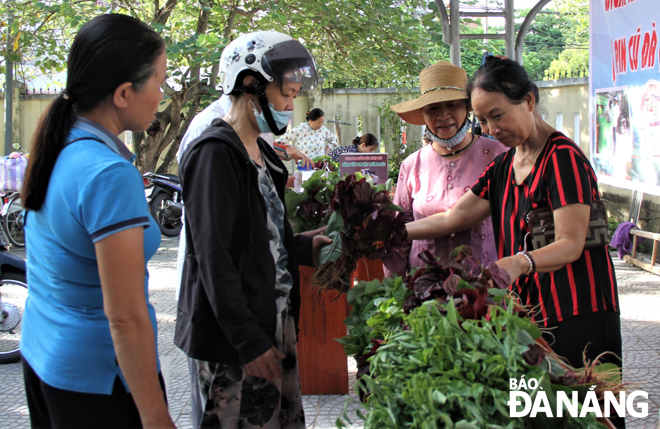Promoting a green lifestyle in the city
In an attempt to raise women’s awareness about environmental protection and environmentally-friendly behaviour, the Da Nang Women's Union has, in recent years, implemented many highly practical models of ‘green lifestyles’, hereby contributing to implementing effectively the project ‘Building Da Nang into an Environmentally-friendly City’.
 |
| Local women selling their home-grown vegetables to raise funds for helping the poor |
According to Chairman of the municipal Women’s Union Nguyen Thi Thu Ha, one of the environmental protection models attracting a large number of people from all walks of life is household solid waste sorting scheme. Encouragingly, family members have showed their great support and active engagement in carrying out waste collection and seperation at the household level.
Every year, this model has raised more than 900 million VND from the sales of recycled waste to help many needy studious pupils and families with difficult circumstances.
Besides promoting waste separation behaviour in the society, the municipal Women's Union has also encouraged its members to effectively develop ‘green lifestyle’ models showing off many specific, practical and easy-to-do tasks.
Accordingly, heed has been paid to saving electricity and water, planting trees and flowers in residential areas, and take advantage of inorganic waste to make such environment- and users-friendly biological products as dishwashing and house cleaning liquid, instead of using conventional chemical ones.
In Thanh Binh Ward, Hai Chau District, dozens of families have grown organic vegetables on vacant land lots as an effective way to ensure a safe food supply for them in tandem with tackling the problem of environmental pollution and the overgrowth of weeds at these venues.
Deterred by rampant unsafe vegetables, local women have taken matters into their own hands by growing veggies by themselves for their families’ consumption and for sale. Many women are keen on selling their home-grown greens to raise funds for helping the poor.
The women have been encouraged to use shopping baskets instead of singleuse plastic bags, and promote banana leaf packaging. Vegetables are simply wrapped in a banana leaf and secured using a flexible piece of bamboo. Banana leaves are a great alternative to plastic as the leaf is large, thick and supple enough to be folded.
Likewise, in Hoa Thuan Tay Ward, Hai Chau District, a green lifestyle has been developed widely. Since the start of this year, women in the locality have planted 1,530 green trees and pots of vegetables, created 58 green-covered areas, and taken care of a large number of public flower beds.
The Hoa Vang District Women’s Union came up with a genius way to protect the environment with the model of ‘growing plants and trees on top of a garbage dump at each household’, which has gained many positive results.
According to the Chairman of the Hoa Vang District Women's Union Le Huyen Tram, women are introduced to transform organic waste into fertilizer for plants. This is an innovative way aimed at reducing the discharge of waste into the environment whilst providing the best nutrition for crops, hereby bringing great benefit to households.
Following the effectiveness of this model, the municipal Women's Union has promoted the implementation of ‘Fruit orchards’ campaign under which residents in Hoa Vang District were provided with training on technical methods on planting and tending plants and seedlings of various kinds of such fruits as guava, jackfruit and mango.
Up to now, the whole district has been home to 195 fruit orchards with a combined total of 10,820 fruit trees of all kinds, thereby helping households enhance their income, escape from poverty, and promote the upgrading of rural areas in this suburb district.
There is no denying that a green lifestyle is of great significance in promoting environmental protection and bringing about economic benefits to locals. The amount of money generated from waste collection and sorting has been used to provide means of livelihoods to poor women, grant health insurance cards, scholarships and bicycles to needy pupils, and help families with difficult circumstances to repair their downgrading houses.